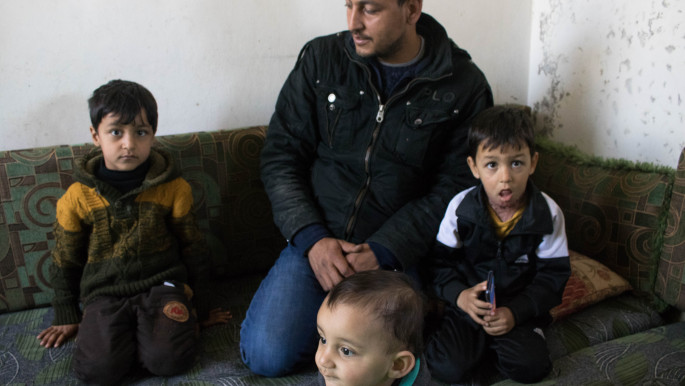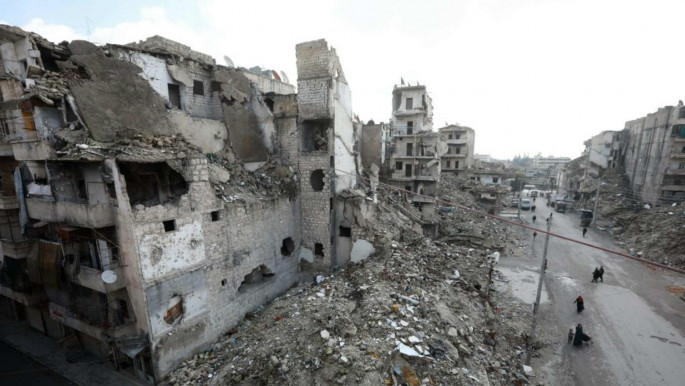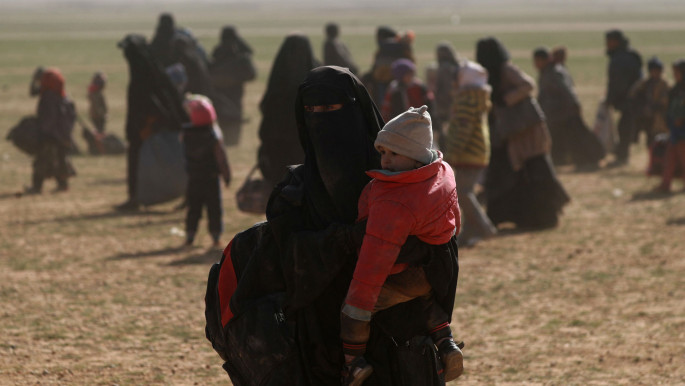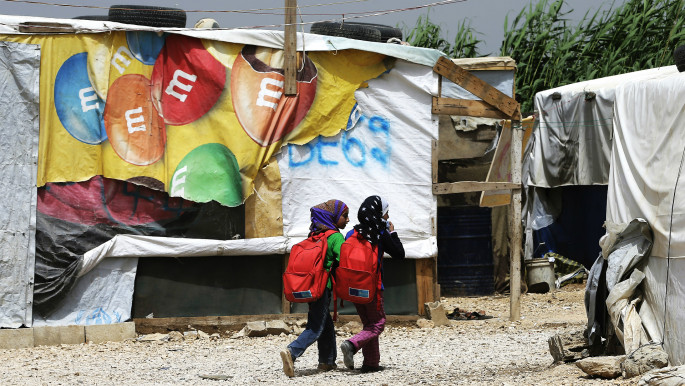Syrian refugees struggle for healthcare in Lebanon
A cold breeze blew through the small living room where four-year-old Ibrahim was lying under a blanket. He was there with his two brothers and his mother and father. Ibrahim sat up and the blanket fell, revealing the scars that covered his chin and neck.
Walid, Ibrahim's father, works at a grocery shop, but the family is still struggling to get by.
"We came to Lebanon six years ago because our village is located near Aleppo and there was conflict all the time in this area due to the political situation," Walid explained.
"We didn't want to be associated with any group, so we decided to come to Lebanon. We moved to a safe place inside Syria because we wanted to finalise all of the legal papers so that we could come here [Lebanon]. My wife, Sara, doesn't have an ID card, so after all the papers were finalised, we came to the border and entered Lebanon."
He added that he used to study law at a university in Aleppo but had to stop attending with two years left for his degree because of the war. Since coming to Lebanon, Walid and Sara have dreamed about returning to their home.
"From the very first day that we came to Lebanon, we have thought about returning to Syria. But because of the situation and because our village is located in a red zone and in an army zone, we can't live there," Walid said.
"I also can't find work back in Syria because the jobs there are so limited. Our home was also destroyed during the war."
During their first year in Lebanon, Walid and Sara struggled to find place to live. However, some relatives were able to help them find a place.
 |
From the very first day that we came to Lebanon, we have thought about returning to Syria. But because of the situation and because our village is located in a red zone and in an army zone, we can't live there |  |
Walid told The New Arab that, six years later, the family's biggest struggles are finding medical care and renewing their residency permits.
"The main problems that we face in Lebanon are the health services, specifically, getting the health services and the legal situation because when we need to renew our residency permits, we need to find a sponsor and finding a sponsor in Lebanon is extremely challenging," he said.
"Whenever we pass through an army checkpoint, they ask for our legal papers."
Prior to Ibrahim's injuries, the family faced multiple heath issues with one of the children being born with jaundice. Walid also explained that the family faces two main problems when they need medical care.
"The first is that we cannot afford the cost of getting screenings because the cost for a screening in Lebanon is extremely high," Walid said.
"The second issue is that sometimes we cannot find the specific person required to help treat a specific disease. This is partially because it can be expensive to try and find this person.
"When we visit a doctor sometimes, they can't give us a clear diagnosis about the patient's situation. We can always visit the pharmacies, but not all pharmacies are able to provide specific types of services."
 |
|
| Walid says the family is still struggling to get by [Nicholas Frakes] |
Then, four months ago, the family faced a medical crisis when they were visiting Ibrahim's cousin. While he was playing, there was a pot of boiling oil that spilt all over Ibrahim causing severe burns to his neck.
"The first thing that we did after the accident occurred was to go to the nearest pharmacy because he was in so much pain," Walid explained solemnly.
"The pharmacist there was a specialist for providing treatment for burns. They told us that Ibrahim's wounds weren't urgent and that it was not a first level burn and that we would treat him in the pharmacy. So, we spent around a month and a half applying cream and medication to the burn. But after this month, we started to notice that Ibrahim couldn't move his neck and that he needed a more advanced treatment."
When asked why they did not take Ibrahim to a doctor immediately after the incident, Walid said that they were not sure if there was a doctor nearby who specialised in burn treatment or where they would be located.
"There's a hospital for an organisation maybe in Zahle [nearby], but we couldn't go there because they don't provide the specific treatment for Ibrahim," Walid said.
After Walid and Sara realised that Ibrahim could no longer move his neck, they began asking everyone that they knew if there was any organisation that could help provide the surgery that their son desperately needed.
 |
|
| Read also: No, of course Syrian refugees can't go home. Here's why |
"After one or two months, a friend of mine who really cared about Ibrahim's situation told me about the SAMS mission," Walid explained.
The Syrian American Medical Society [SAMS] is a non-profit global medical relief organisation that works on the front lines of crisis relief in Syria, as well as in neighboring countries, like Lebanon. It aims to provide medical care and treatment to patients in need.
"I contacted SAMS and the contact asked us to send him any medical report or pictures that we might have. After sending a picture and the medical report, we waited for 10 days. Then they contacted us about a surgery. We visited the doctor and they conducted the surgery."
Ibrahim got the surgery around a month ago and while his condition has improved significantly, the doctors told his parents that this would not be enough.
"During the first phase, the doctor informed us that Ibrahim would need more than three surgeries in order for him to be normal again. But, in that first phase, the benefit has been that Ibrahim can now move his neck again. He regained the ability to move his neck back and forth," Walid said.
"We can also see that he is not feeling pain anymore and he is moving his neck. But we have already been informed that Ibrahim needs follow-up surgeries and we are looking for follow-ups. We are grateful that we were able to meet with SAMS and use their services."
If Walid and Sara want Ibrahim to get the surgery before another SAMS mission, then they would have to pay for the operation themselves. However, they are hesitant to do so due to the high costs for the operation.
They are waiting for another organisation, or, maybe, for another SAMS mission to come, so that they can complete Ibrahim's follow-ups.
"Due to the Syrian refugee situation in Lebanon, there is always a need in the health sector which is not covered by other actors; mainly the UNHCR or other UN actors or international non-governmental organisations [INGOs] because the priority is still on basic assistance and humanitarian assistance. There is, also, always a gap in funding to cover these health sectors," SAMS country director Mireille Dika explained.
"Medical missions are mainly to provide services that aren't being provided by other actors, no matter if it is health or another sector. There is always a need in the health sector for types of services or surgeries that can actually affect the lives of people in this community. And the medical missions are meant to come and provide this service through volunteers from all different countries from all around the world who come to do these surgeries in Lebanon and elsewhere."
Most of SAMS medical missions in Lebanon are around every two months and change according to the needs of the people. During these missions, doctors from all around the world come to volunteer their time in order to try to help as many people as possible.
 |
Due to the Syrian refugee situation in Lebanon, there is always a need in the health sector which is not covered by other actors |  |
"They arrive in the afternoon or at night and they start working the day after and it's from six in the morning until, sometimes, 10 or 11 at night," Dika said.
However, she added that she has seen some doctors working until after midnight in order to get as many people the aid that they need. All of the doctors who come pay for their own plane tickets, hotels and any other costs that they might have. Despite this, Dika explained that doctors are always more than willing to volunteer and almost all of the doctors who volunteer end up volunteering again and again.
Rather than having medical missions that focus on general medical needs, SAMS' medical missions are specialised to meet the needs that the NGO determines are the most required by those that they are helping.
Dika told The New Arab, "Whenever we decide to run a mission it's going to be a specialised mission. For example, we had a women mission, the first one [mission] this year, and all of the doctors and nurses who volunteered were specialised in this specialty of the medical sector."
She added that there is also a roster for those who volunteer, but whose specialty is not needed for the upcoming mission. The doctors on the roster are able to come as soon as the mission is announced.
"There are some specific missions that have to happen every year because the need is always there based on the assessments that we do. And there are missions that are based on the needs that we can find," Dika explained.
In order to comply with regulations set out by the Lebanese government, SAMS takes the names of those who are coming to volunteer for the week-long mission and sends them to the Ministry of Health to be registered and so that they can work at the local hospital or clinic that SAMS is working out of.
"We are working with hospitals that are registered with the Ministry of Health with whom we share the names of volunteers before they arrive and they provide it to the ministry and they are given approval to come for a specific number of days to exchange experience with local doctors," the country director said.
"We work with hospitals for providing surgeries and we work with clinics for screenings. We go to the camps, but we do not establish a field hospital. We go to camps to provide family healthcare provide screening for patients and to refer them to medical missions for surgeries and hospitals."
 |
|
| Read also: Syrian widows struggle with living costs and exploitation |
In addition to the patients benefiting from SAMS' work, Dika added that its all of the doctors involved, as well, who gain something from the experience. While doctors come internationally to volunteer with SAMS, they also have local doctors working with them during medical missions. This allows for both local and international doctors to trade experiences and expertise and to learn from each other.
She said, "I would say that not only the patients benefit from these missions, but also the local doctors who are involved from the hospitals where we work. They establish relationships with these international doctors and this kind of exchange in experience.
"They communicate with each other after the mission and they ask questions and they ask about specific equipment and stuff like that which is really nice to see."
It is not just doctors who volunteer with SAMS. Many locals who have either been patients themselves or had family members who were patients that SAMS have come to SAMS' aid in translating, photography and in many other things. This became especially evident when Storm Norma swept through Lebanon in January.
Dika said, "When SAMS decided to have its first emergency response following the storms in Lebanon this year in January, we had people from the informal settlements and say 'I have a small truck and I am willing to drive you and pick you up all for free so that you can go and reach and redistribute whatever you want.' These people have a lot more to give than you can imagine."
In order to find patients and to get the word out to those in need after a medical mission is planned, SAMS reaches out to NGOs, hospitals and through WhatsApp to reach as many people as they can.
 |
In order to find patients and to get the word out to those in need after a medical mission is planned, SAMS reaches out to NGOs, hospitals and through WhatsApp to reach as many people as they can |  |
"Whenever we have a medical mission set, we advertise for it," Dika explained. "We design an ad in English and Arabic. We share it, first, with all of the INGOs and we have a health working group in Lebanon that we share it with and we share it with UN agencies. And, then, we share it with all of the hospitals that we know. We share it on WhatsApp groups and all of that.
"There are three ways to register: focal points, through phone numbers or WhatsApp or through emails from other medical groups to get referrals for patients that need to be screened to see if there is a need for a surgery.
"And, then, we have a lot of patients and based on their medical file, or if they don't have one, we try to get everyone screened and the priorities are set up by the doctors."
Walid and Sara were able to get in contact with SAMS through WhatsApp.
"We were both very emotionally affected by what happened to Ibrahim. Especially his mother because she would put the medication and the cream on his burns. So, she was very emotionally affected by what had happened," Walid said.
"If SAMS mission hadn't come, then we would have had to consider going back to Syria because, maybe, there we can find someone who can help us, or we can more easily access the surgery because it is less expensive in Syria."
Following the surgery, they were told that they should wait at least three months before attempting the second surgery that Ibrahim needs. However, even if they wait for those three months, they will still need to wait for either another SAMS mission or for another NGO to be willing to help them since they cannot afford the cost of an operation.
Sara said, "One the first level, we need Ibrahim to feel more relaxed to be better. After that maybe we can find an organisation that can help with the surgery."
 |
|
| Four-year-old Ibrahim requires a second surgery [Nicholas Frakes] |
Dika agreed that the follow-up after an operation is extremely important. Since the medial missions only last for a week, SAMS had to create a system in which the patients are able to contact and get information from their doctors.
"I can show you how many WhatsApp groups we have now," Dika laughed. "They are patients communicating with doctors or patients communicating with us about specific questions that they have. Then we go and take video and pictures that we share with the doctors and, then, they tell us 'Let's do this and that' or 'We need to plan another mission.'"
The one medical mission was an orthopaedic mission during the start of April with only two doctors screening 130 people. They also performed 28 surgeries with each one taking anywhere from two to seven hours.
The latest mission took place at the end of April and focused on dental check-ups for children.
"Making children be able to stand in front of a mirror and smile and be happy with what they see is the goal of the mission," Dika said.
For Ibrahim, while he may have only received one of the surgeries that he needs, this one has changed his life. Not only is he now able to move his neck, but his personality has slowly begun to return to how it was before his accident.
"Before the surgery, he wouldn't eat that much," Walid said. "He basically had no appetite. Directly after the surgery, he started eating again.
"Also, before the surgery, Ibrahim would isolate himself and wouldn't want to play with others. Now, he is more willing to play with others, but if someone asks him about his burns, then he will go away and leave."
In Al-Rahmeh, an informal settlement located in Bekaa, Bushra, a Syrian refugee, sits with her newborn daughter in her arms inside a tent.
"I came to Lebanon three years ago from Deir az-Zour. I came, firstly, because of the war and the crisis and, secondly, because my house was destroyed during the crisis and we [my husband and I] couldn't find a place to live in Syria," Bushra explained.
"I was arrested for one month in Syria after coming getting to the Lebanese-Syrian border because it was closed at the time."
 |
|
| Read also: A right to education: Saving Syrian refugee children from becoming a lost generation |
She now has two children with the eldest being aged two years while her newborn is only two months. Bushra explained that the biggest struggle that she faces is finding work and making money to provide for her children.
"I get paid $4 (£3) per day, but I can't always find work, so sometimes I only work one to three days per month. I pay around $800 (£610) per year for this shelter," she said.
However, she does not get the shelter to herself. There are two other families that share the tent with Bushra and there is no mattress for them to sleep on. Only cushions that are often used for sitting.
"Life is constantly becoming more and more difficult here in Lebanon. Especially because of the financial situation. For us, it is very weak," she said. "Because of the financial situation, I am very, very grateful that SAMS provides me with its services because I cannot afford the cost and I cannot afford to [go to the hospital] to deliver [my baby]."
During SAMS' first mission of the year, midwives visited the camp and offered free screenings for the women there.
"I don't have money to pay for the surgery. During the women's medical mission, there was a group of midwives that visited the camp for screening and consultation," Bushra said softly. "I visited the midwife, and, during the consultation, I was directly referred to the hospital to deliver my daughter.
"Before SAMS' mission, I couldn't afford the surgery and I am registered with the UNHCR, but I am not benefitting from the UNHCR services. Especially from the food and the cash [assistance] service."
Despite her pregnancy, Bushra never visited a doctor because she would have to pay a small consultation fee which is something that she is not able to afford.
"If I want to visit a doctor, I will need to pay around $15 (£11) and I can't afford the consultation fee. So, I was waiting from the first month until the ninth month for when SAMS mission came to the camp and I was consulted for the first time by the midwives," the new mother said.
Bushra is also unable to pay for all of the expenses that her new child needs, such as milk. In order to make money, she has worked in agriculture and also relies on her husband to bring money on the few occasions that he visits her.
"First, I worked with the shawish [informal head of the camp] in order to get paid and to cover these expenses," she explained. "Also, my husband lives in Beirut and works in construction. He comes every three months with a small amount of money to cover the daily expenses."
When asked what she wants most for her children, she said that she wants "them to be happy" and that she wants them to be able to "study in the best schools".
After she gave birth to her youngest daughter, she decided that she wanted to honour those who had helped to bring her into the world.
So she named her Sams.
Nicholas Frakes is a freelance journalist who reports from London, the Middle East and North Africa.
Follow him on Twitter: @nicfrakesjourno





 Follow the Middle East's top stories in English at The New Arab on Google News
Follow the Middle East's top stories in English at The New Arab on Google News


